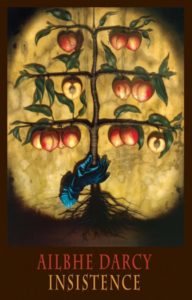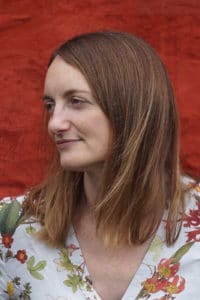We live in a time when the boundaries between the public and the private have blurred. Wittingly or not, we’ve surrendered traditional notions of privacy to the large social media platforms, not to mention the assorted activities we undertake daily in e-commerce. Everyone, it seems, is in the data collection business — our data.
Similarly, the lines between the public and private spheres have blurred as well. Politics have reshaped friendships and family relationships. The great issues of the day seem to demand that everyone must take a position and private actions to solve public crises. We hear that immigration, environment, climate change, populists vs. elites, health care, and more require our committed response and action.
Ailbhe Darcy is an Irish poet currently living in Wales. She was educated in the United States and spent time in Germany. She’s attuned to issues on both sides of the Atlantic. In her new collection Insistence, she’s asking questions. What do these issues mean for my private life? What is my responsibility as a poet? What is my responsibility as a mother of a child?
I would have been disappointed if she had definitive answers to her questions. She doesn’t. Her poems explore possible answers, and they don’t arrive at resolutions. In short, she finds herself where most of us find ourselves as well.
She includes several poems about her family and especially her son. His existence has changed everything, including what questions she’s asking and where she begins to look for answers.
After my son was born

of my bedazzled eyes.
Flesh pooled around me,
so that it was difficult to run.
Disease squeaked an entrance
at the corners of window frames,
the gap beneath the door, my
shut mouth.
I wished you all dead.
After my son was born,
my mother came to me
and was gentle.
Insistence is divided into two sections. The first section of 18 poems considers an array of topics. The second section is 11 poems of varying length (some quite short and others quite long) that look at the 1981 work Alphabet by the experimental poet Inger Christensen (1935-2009). In Alphabet, Christensen explored the idea of whether beauty could exist after Hiroshima. Several of Darcy’s poems pay tribute to Christensen by their similar structures and themes.

Ailbhe Darcy
Darcy received her MFA and Ph.D. degrees from the University of Notre Dame, and she taught there and at the University of Munster in Germany. She’s currently a lecturer in creative writing at Cardiff University. Her poetry has been published in numerous literary journals and anthologies, and Insistence was shortlisted for the 2018 T.S. Eliot Award. Her first poetry collection, Imaginary Menagerie, was published in 2011.
The questions Darcy asks in Insistence continue to be asked. She answers one of them — what is the responsibility of the poet? — by creating a collection like this one. It asks for our serious consideration, but it doesn’t provide a set of demanding answers we must follow. And that is the collection’s fundamental strength.
Photo by Diana Robinson, Creative Commons, via Flickr. Post by Glynn Young.
__________________________

“I require all our incoming poetry students—in the MFA I direct—to buy and read this book.”
—Jeanetta Calhoun Mish
- Poets and Poems: Avraham Stern and “A Soldier and a Poet” - July 15, 2025
- Poets and Poems: Beth Copeland and “I Ask the Mountain to Heal My Heart” - July 10, 2025
- A.E. Stallings: the Parthenon Marbles, Poets, and Artists - July 8, 2025

Leave a Reply